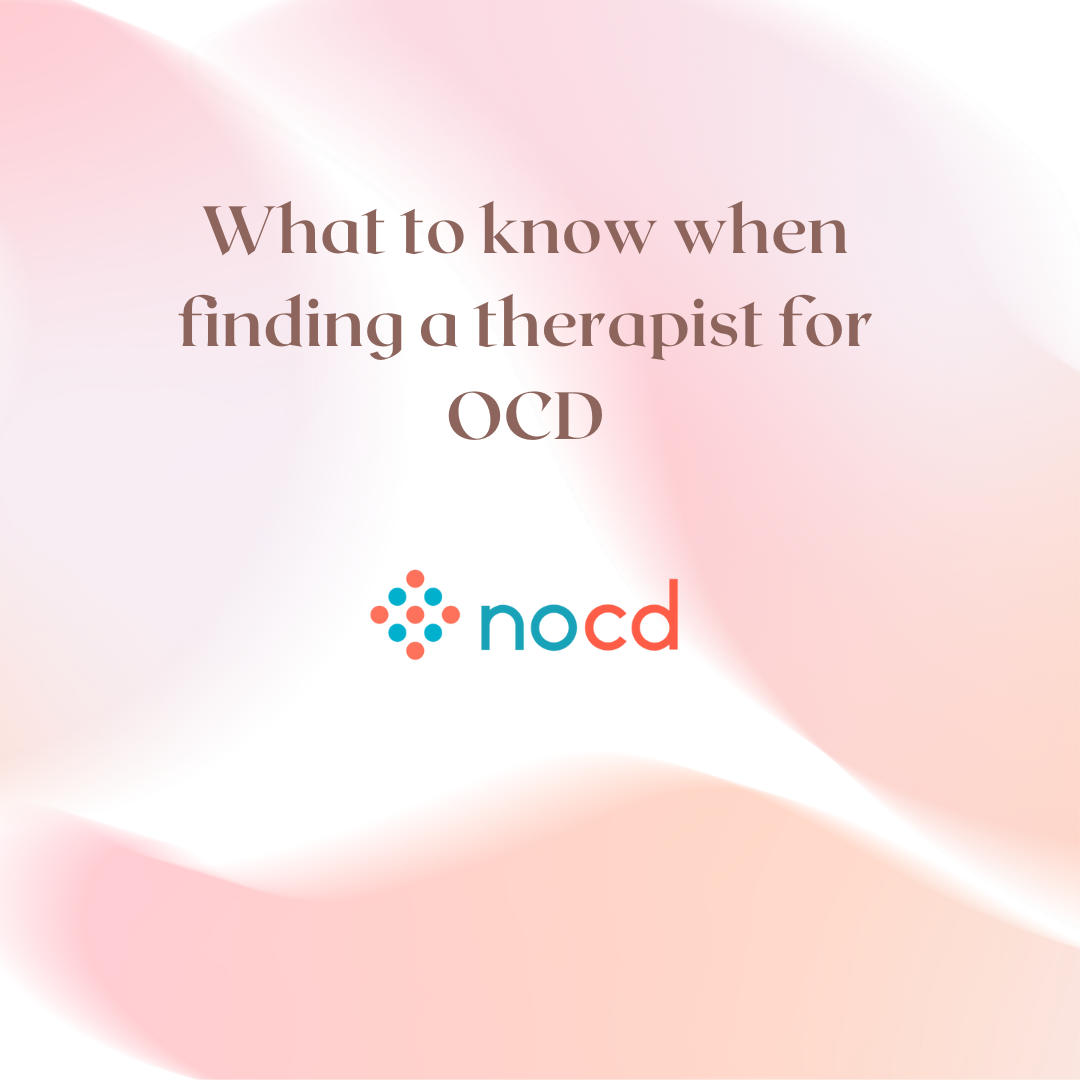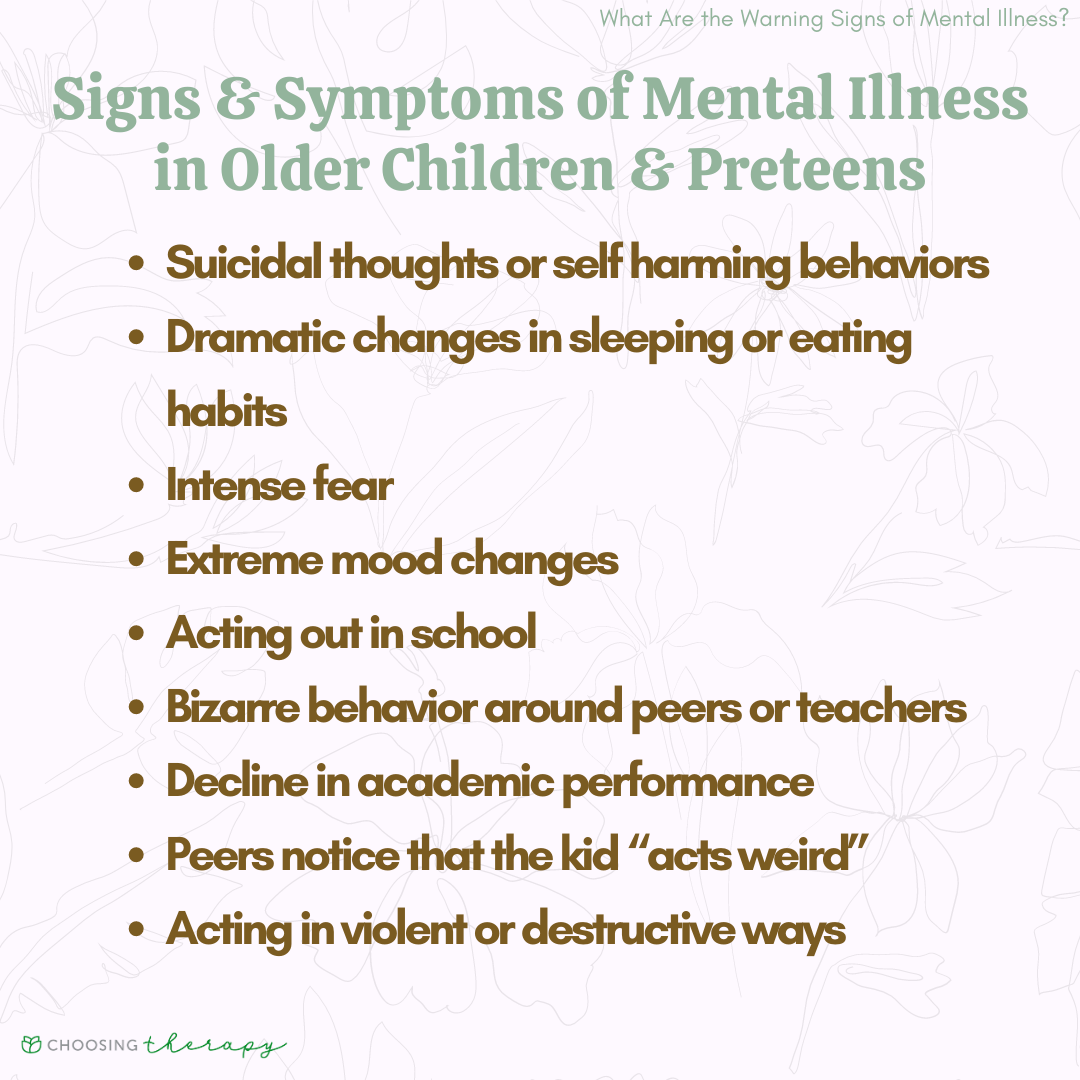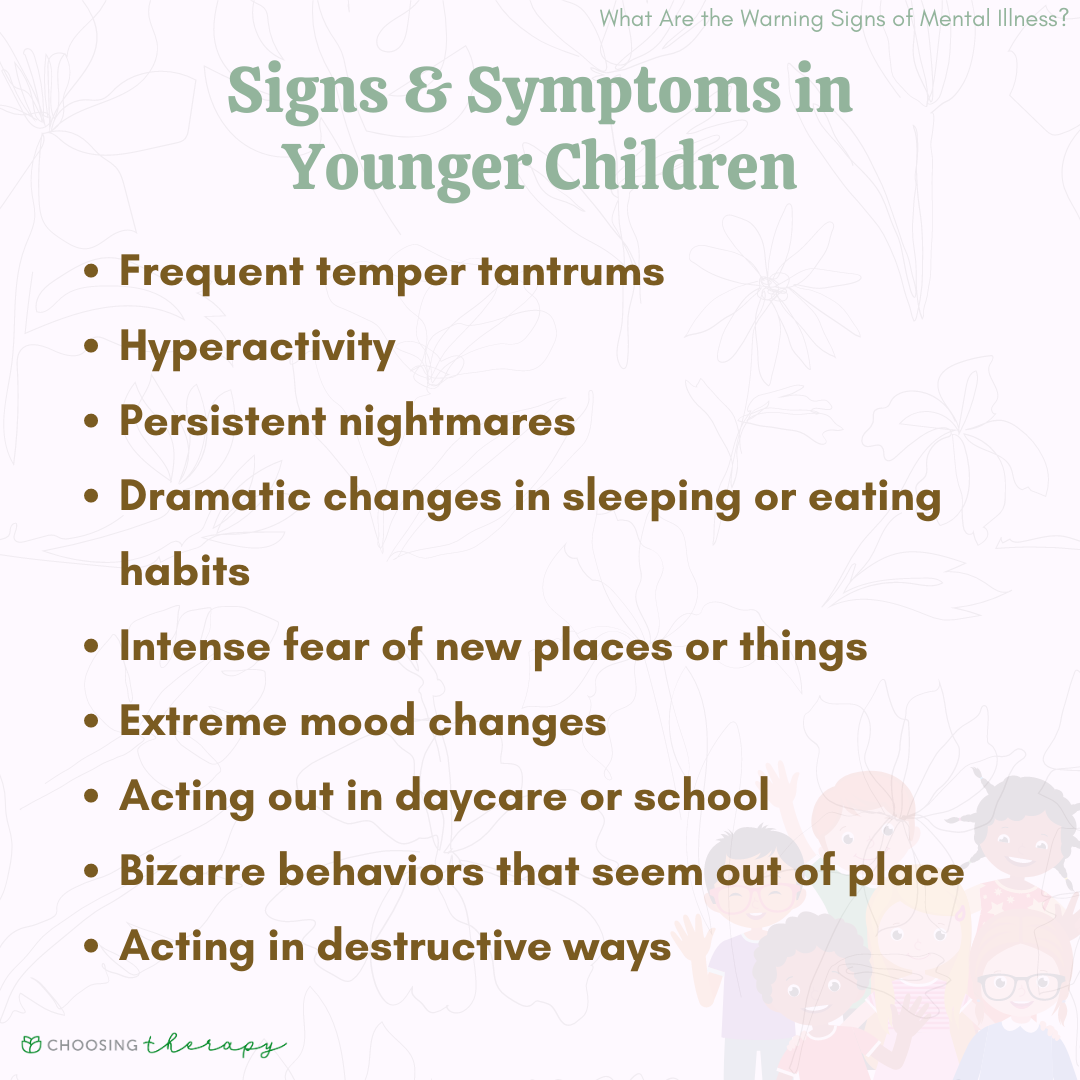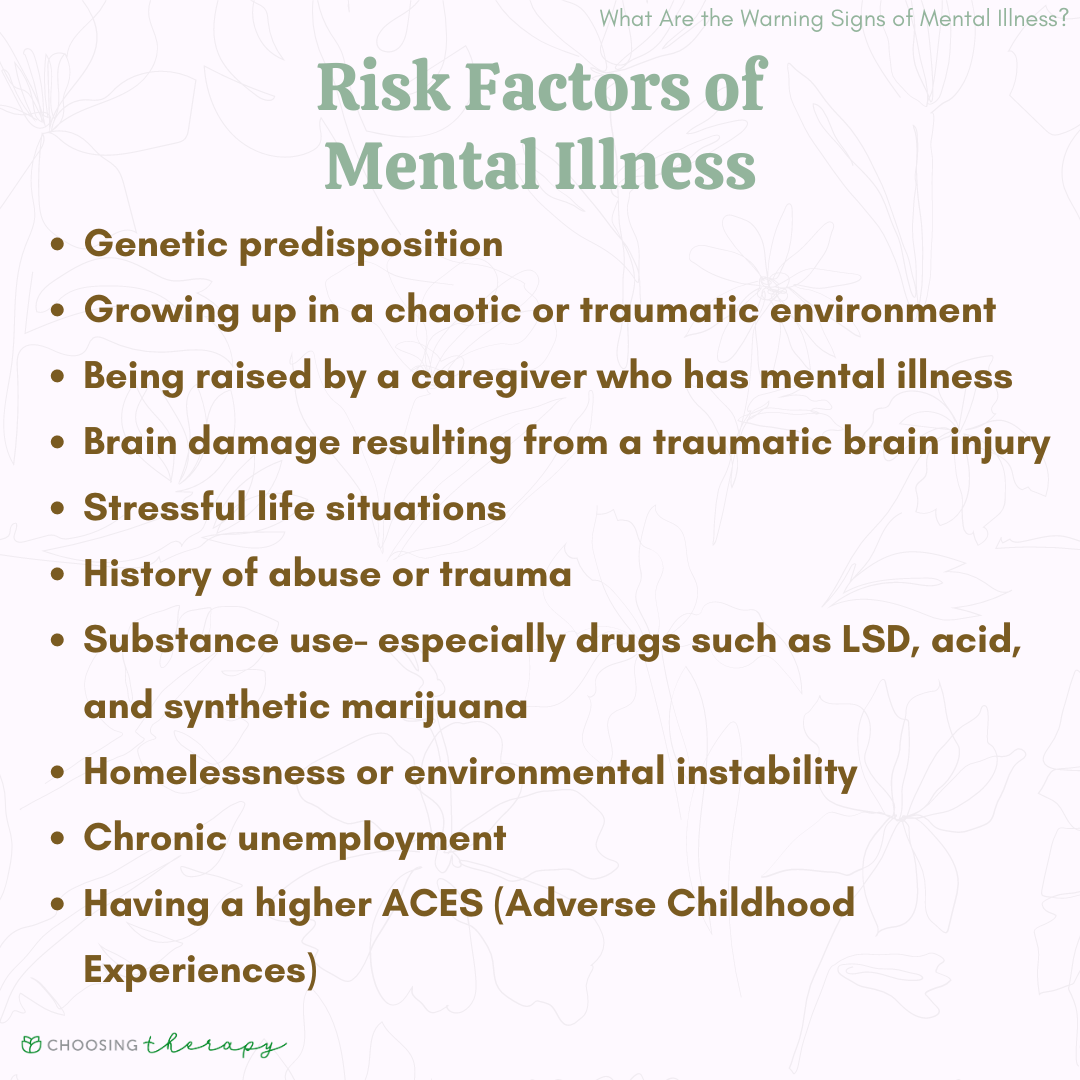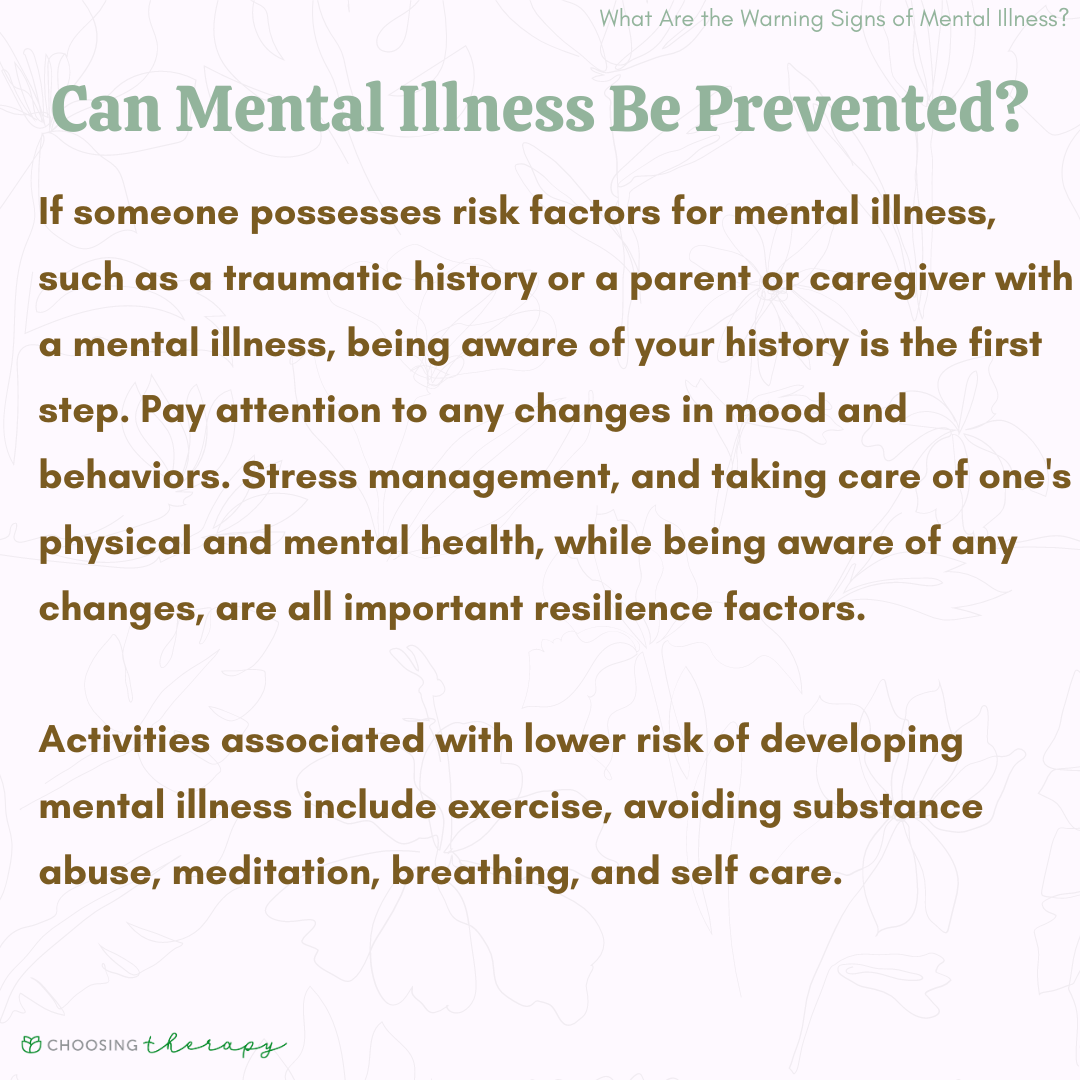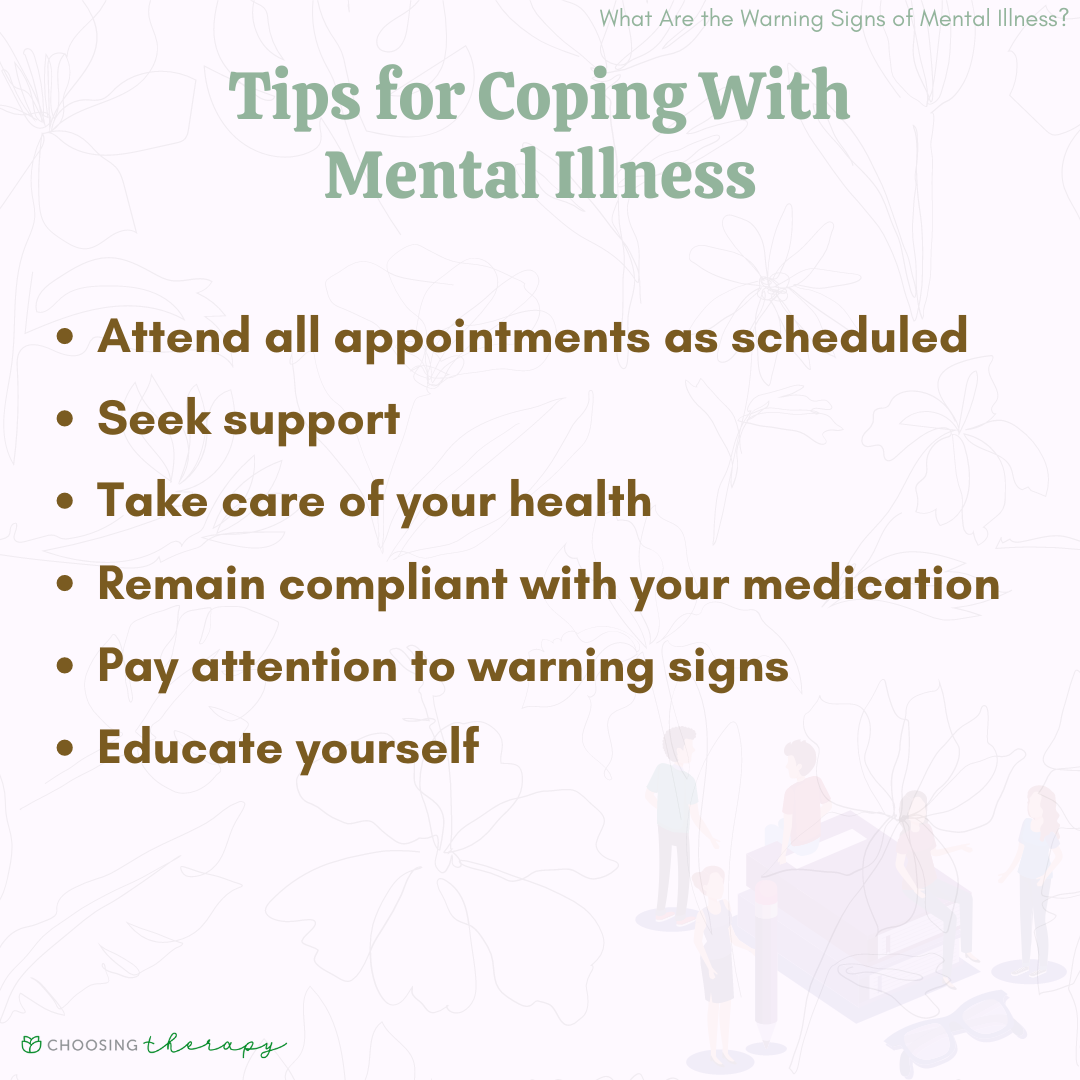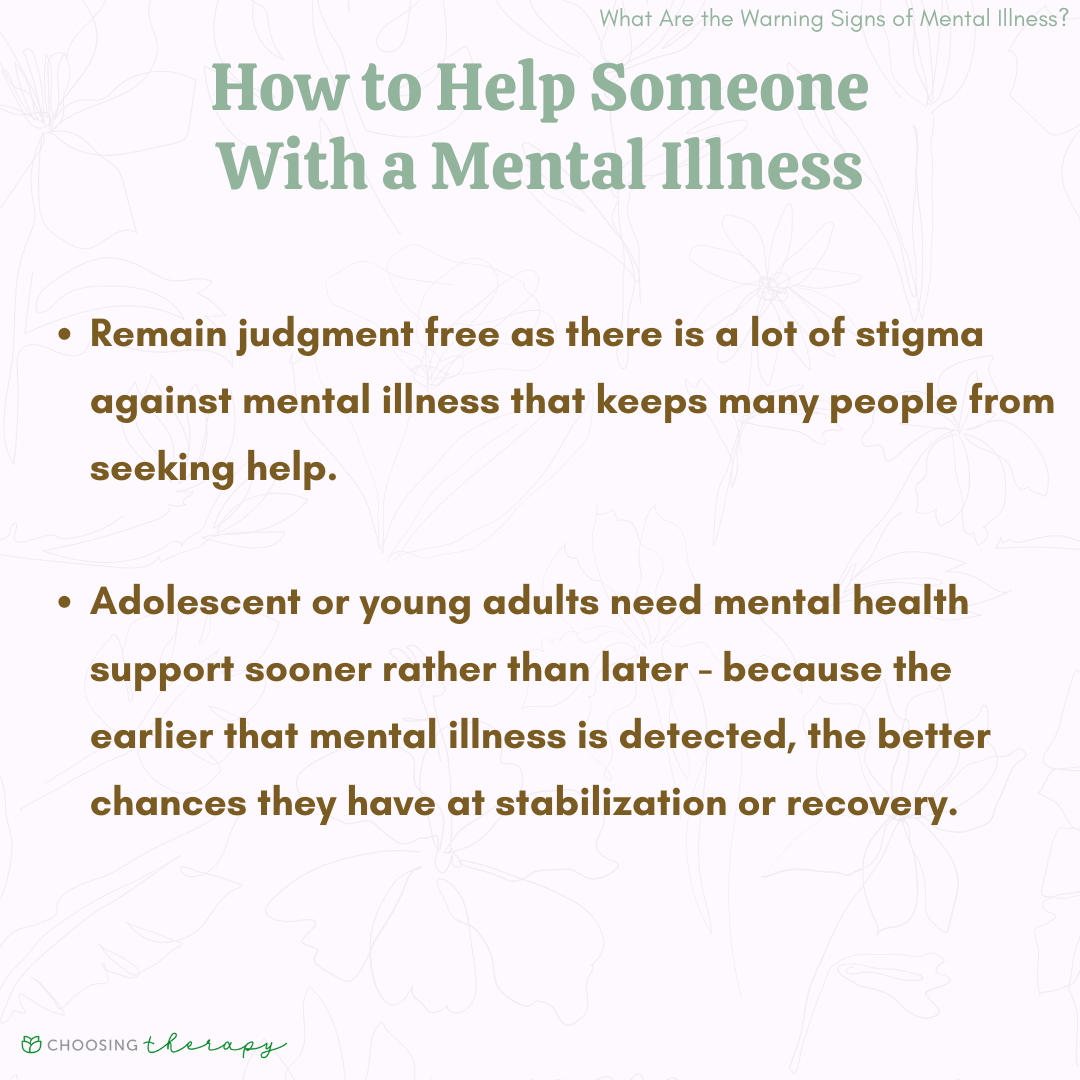
Occasionally feeling sad or anxious is a normal part of the human experience. But if these feelings start to become excessive, it might be a sign of something more. Some of the warning signs of mental illness include excessive paranoia, decline in ability to care for self, or problems concentrating or completing tasks.
Would you like to try therapy? BetterHelp has over 20,000 licensed therapists who provide convenient and affordable online therapy. BetterHelp starts at $65 per week. Take a Free Online Assessment and get matched with the right therapist for you.
What Is Mental Illness?
Mental illness is when a mental health condition affects your thoughts, behaviors, and moods. There is a lot of overlap between “normal” behaviors and the experiences and symptoms of mental illness. For example, everyone feels distracted or unable to complete tasks sometimes, or experiences sadness or anxiety, and it does not automatically mean they have mental illness.
The difference between mental illness and normal life experiences is how long they last, their severity, and their effect on your life. There is a difference between normal worry and anxiety and having an anxiety disorder, for example. Likewise, there is a difference between depression and sadness.
Types of Mental Illnesses
The term mental illness is broad, and refers to everything from minor, non-life altering mental health concerns such as mild anxiety and depression, to severe and debilitating mental illnesses that greatly affect a person’s life.
There are many types of mental illnesses and each present with their own symptoms and causes.
Common types of mental illnesses are:1
- Impulse control disorders: People who have impulse control disorders are plagued with impulses to do certain behaviors that are usually illegal or harmful. Some common examples are pyromania (when someone has impulses to start fires), kleptomania (when someone has impulses to engage in stealing).
- Anxiety disorders: People who have anxiety disorders experience frequent panic and dread. Sometimes these are in relation to specific objects, places, or people. However sometimes they are persistent and unable to be related to anything specific.
- Mood disorders: Mood disorders are mental illnesses that affect your ability to regulate your mood, such as depression. Depression is much more than being sad, as it is a period of prolonged sadness that affects sleep, self worth, and other major areas of one’s life. Depression is one of the most common mental health conditions in the United States.2
- Psychotic disorders: These mental illnesses affect one’s thoughts and perceptions. Hallucinations and delusions are the most common symptoms of psychotic disorders such as schizophrenia.
- Obsessive disorders: Disorders such as obsessive compulsive disorder, or OCD, are disorders where someone experiences frequent and persistent thoughts and fears, then performs behaviors or routines to mitigate these intrusive thoughts.
- Eating disorders: This is when someone has extreme preoccupations, behaviors, and emotions around food, eating, and body image. Some common eating disorders are binge eating disorder, anorexia, and bulimia.
- Post traumatic stress disorders (PTSD): These are disorders that develop as a result of traumatic events. Someone could have PTSD as a result of an attack or after surviving a disaster that was prolonged such as war. Many people also develop symptoms of PTSD or even complex-PTSD (C-PTSD) following abuse or childhood trauma.
- Personality disorders: A personality disorder is when someone has personality traits that negatively affect their ability to relate to others.
- Adjustment disorders: These are disorders that may display symptoms of mental illness such as anxiety, depression, changes in sleep, etc. Adjustment disorders are usually stress responses following a traumatic event or natural disaster. They are usually shorter in length, beginning around 90 days after the event and usually ending around the six month mark.
Top Rated Online Therapy Services BetterHelp – Best Overall “BetterHelp is an online therapy platform that quickly connects you with a licensed counselor or therapist and earned 4 out of 5 stars.” Get 20% off your first month! Visit BetterHelp Talkspace - Best For Insurance Talkspace accepts many insurance plans including Optum, Cigna, and Aetna. Typical co-pay is $30, but often less. Visit Talkspace
Mental Illness Warning Signs & Symptoms
The first sign that most people notice as symptoms of a mental illness is an overall feeling that something feels off or different. However, each type of mental illness has its own set of warning signs and symptoms.
Those who are concerned about having, or about a loved one possibly having a mental illness, should be on the lookout for sudden behavioral changes, or behaviors and speech that is out of character. While mental illness is most likely to appear in adolescence,3 the appearance of warning signs will change with age.
Signs & Symptoms in Adults, Young Adults, & Adolescents
Often, the signs and symptoms of mental illness are different for adults and adolescents than for children. However, recognizing signs and symptoms of mental illness in children is crucial, as adolescence is the peak onset. “The peak age of onset for many psychiatric disorders is adolescence, a time of remarkable physical and behavioral changes.”3
Warning signs and symptoms of mental illness in adults and adolescents include:4
- Thoughts of suicide or self harm
- Substance abuse
- Paranoia
Signs & Symptoms of Mental Illness in Older Children & Preteens
Recognizing signs and symptoms of mental illness in older children and preteens is different from recognizing them in adults. Most parents and caregivers of children and preteens who are diagnosed with mental illness notice changes in behaviors first.
Warning signs and symptoms of mental illness in older children and preteens include:
- Suicidal thoughts or self harming behaviors
- Dramatic changes in sleeping or eating habits
- Intense fear
- Extreme mood changes
- Acting out in school
- Bizarre behavior around peers or teachers
- Decline in academic performance
- Peers notice that the kid “acts weird”
- Acting in violent or destructive ways
Signs & Symptoms in Younger Children
Recognizing signs and symptoms of mental illness in young children is important due to most younger childrens’ inability to articulate their experiences to others. Therefore, the parents and caregivers have to watch for behaviors that appear to be changing or are uncharacteristic.
Warning signs and symptoms of mental illness in young children include:
- Frequent temper tantrums
- Hyperactivity
- Persistent nightmares
- Dramatic changes in sleeping or eating habits
- Intense fear of new places or things
- Extreme mood changes
- Acting out in daycare or school
- Bizarre behaviors that seem out of place
- Acting in destructive ways
Causes of Mental Illness
There are different causes of mental illness. Researchers are limited in their knowledge of what exactly causes mental illness due to the many factors and variables involved in the human experience.
Because we know that “multiple factors can lead to the same disorder,” and that same “factor can result in different mental disorders,” it is understandably difficult to pinpoint exactly what causes mental illness.5
Mental Illness & Genetics
There is a general agreement that many of the causes of mental illness include genetics, environmental stressors, and trauma history, among other things. We do know that there is a genetic link in families that can make someone predisposed.6
Mental Illness & Brain Chemistry
Mental illness is thought to be affected by our brian chemistry. Things that affect brian chemistry include genetics, environmental factors and substance use. Experiencing trauma in childhood alters the brain chemistry, as well as using drugs or substances in excess. These put people at an increased risk for mental illness.
Mental Illness & Environmental Stressors & Toxins
Most clinicians are in agreement that mental illness is greatly affected by one’s personal history. Having Adverse Childhood Experiences, or ACEs “are linked to chronic health problems, mental illness, and substance misuse in adulthood.”7
Risk Factors of Mental Illness
There are some risk factors that may increase a person’s likelihood of developing a mental illness.
Some of the risk factors for developing a mental illness include:
- Genetic predisposition6
- Growing up in a chaotic or traumatic environment
- Being raised by a caregiver who has mental illness
- Brain damage resulting from a traumatic brain injury
- Stressful life situations
- History of abuse or trauma
- Substance use- especially drugs such as LSD, acid, and synthetic marijuana
- Homelessness or environmental instability
- Chronic unemployment
- Having a higher ACES (Adverse Childhood Experiences)
Impact of Mental Illness
Along with your emotional and physical health, having a mental illness can impact every part of your life, from work to relationships, to your ability to care for your daily needs. However, it is important to note that many people live fulfilling lives every day with support and treatment.
Possible impacts of mental illness include:
- Mood instability
- Fears of going out in public
- Decline in self care
- Struggling with taking care of daily activities and needs
- Social isolation
- Developing a substance use disorder
- Impacts on personal relationships
- Sexual difficulties
- Struggles with job performance
- Difficulty with concentration
- Impulsive behaviors
- Difficulties with sleep
- Changes in appetite
Find the perfect therapist for you, with BetterHelp. If you don’t click with your first match, you can easily switch therapists. BetterHelp has over 20,000 licensed therapists who provide convenient and affordable online therapy. BetterHelp starts at $65 per week. Take a Free Online Assessment and get matched with the right therapist for you.
Can Mental Illness Be Prevented?
Many people want to know if mental illness can be prevented. If someone possesses risk factors for mental illness, such as a traumatic history or a parent or caregiver with a mental illness, being aware of your history is the first step. Paying attention to any changes in mood and behaviors is crucial. Stress management, and taking care of one’s physical and mental health, while being aware of any changes, are all important resilience factors. Additionally, activities associated with lower risk of developing mental illness include exercise, avoiding substance abuse, meditation, breathing, and self care.
Diagnosing Mental Illness
If someone believes they may have a mental illness, or they see signs of one in a loved one, it is important to talk to a licensed clinician. Many things such as depression or anxiety can be easily self diagnosed with the presenting symptoms, but it is still a good idea to get a professional opinion to help you work through the diagnosis and rule out anything else.
If you or someone you love is experiencing hallucinations or paranoid thoughts, or other symptoms, it is important to have an assessment with a licensed provider instead of attempting to self diagnose.
Treating Mental Illness
Having some symptoms of depression or anxiety, especially after a difficult event such as work or relationship stress, are normal. However, if you find that you are experiencing worse symptoms than normal, or they are affecting your quality of life, it might be time to seek therapy.
Options for finding a therapist include looking for one using an online therapist directory or through an online therapy platform. For some, medication management is helpful. If you do not have a primary care doctor to speak with, or want someone who specializes in mental health, online psychiatrist options are available.
Therapy Options
Therapy is beneficial for most mental illnesses, particularly those with symptoms of depression, anxiety, or traumatic histories that need to be worked through. An assessment by a therapist can help you determine your personal needs.
Medications
Many people benefit from taking medications to help alleviate symptoms of their mental illness. Your medical provider can work with you to determine the best medication for you, as there are many different options available.
Alternative Treatments
For those who have not found relief from symptoms through medications and psychotherapy, there are some alternative treatment options, such as cranial electrotherapy stimulation (CES), transcranial magnetic stimulation (TMS), and others.
Would you like to try therapy? BetterHelp has over 20,000 licensed therapists who provide convenient and affordable online therapy. BetterHelp starts at $65 per week. Take a Free Online Assessment and get matched with the right therapist for you.
Tips for Coping With Mental Illness
If you have been diagnosed with a mental illness, this is no reason to worry. Staying on top of your symptoms by being aware of your experiences can help you cope. Engaging in activities and behaviors that you find enjoyable and supportive can boost your mental health and increase the likelihood that you receive the support you need along your journey.
Remaining compliant with your medication and staying in touch with treatment providers are other ways someone can support their mental health and prevent relapse.
Here are tips for coping with mental illness:
- Attend all appointments as scheduled: Attending regular follow ups with your therapists and/or prescribers will ensure that your providers are able to notice any decline in mental health symptoms and be able to intervene accordingly.
- Seek support: If you are experiencing suicidal ideation or desire to self harm, do not ignore it and hope it will just go away. There is no shame in seeking support. Call a friend or family member, or the local crisis line. In the U.S., call or text 988 to reach the 988 Suicide & Crisis Lifeline.
- Take care of your health: Maintaining your physical health is important to your mental health, as it can help mitigate the symptoms of your mental illness. Be sure to take your medications for diabetes, high blood pressure, etc, as well as engaging in yoga or other exercise for mental health.
- Remain compliant with your medication: If you are prescribed any medications for your mental illness, remaining compliant with your medication regimen is crucial to help avoid relapse. If you are noticing any adverse or unpleasant side effects of your medications, do not just stop taking them. Instead, bring them to your prescriber’s attention to see if they can work with you to come up with a better solution.
- Pay attention to warning signs: It is important to identify a problem quickly, as this can help prevent relapse. Know what your warning signs are: excessive anxiety, decline in hygiene, increase in isolation, etc.
- Educate yourself: Knowing about your mental health diagnosis and symptomatology, as well as knowing about your medications or any other treatment you are receiving will help empower you.
How to Help Someone With a Mental Illness
- If you suspect that a loved one has a mental illness, there are some things you can do to help. Remaining judgment free is crucial, as there is a lot of stigma against mental illness that keeps many people from seeking help. Be open to talking with them about their experience and support them with seeking help if they are interested in doing this. You can not force someone to get mental health treatment, but providing judgment free support will make them more likely to confide in others about their symptoms.
- If the person is a young person such as an adolescent or young adult, it is crucial to get them mental health support because the earlier that mental illness is detected, the better chances they have at stabilization or recovery.9
In My Experience
In my experience, those who are exhibiting some of the warning signs of mental illness have many different experiences along their journey. Some come to therapy knowing that “something feels off” but they might have difficulty articulating what it is. Others are brought in by family members after being observed exhibiting behaviors that seem out of character or bizarre. No two mental health journeys are exactly alike. But the earlier that someone seeks- and receives- support, the better chance they have at living a fulfilling life.
To help our readers take the next step in their mental health journey, Choosing Therapy has partnered with leaders in mental health and wellness. Choosing Therapy is compensated for marketing by the companies included below. Online Therapy BetterHelp – Get support and guidance from a licensed therapist. BetterHelp has over 20,000 therapists who provide convenient and affordable online therapy. Take A Free Online Assessment and get matched with the right therapist for you. Free Assessment Online Psychiatry Hims / Hers If you’re living with anxiety or depression, finding the right medication match may make all the difference. Connect with a licensed healthcare provider in just 12 – 48 hours. Explore FDA-approved treatment options and get free shipping, if prescribed. No insurance required. Get Started Medication + Therapy Brightside Health – Together, medication and therapy can help you feel like yourself, faster. Brightside Health treatment plans start at $95 per month. United Healthcare, Anthem, Cigna, and Aetna accepted. Following a free online evaluation and receiving a prescription, you can get FDA approved medications delivered to your door. Free Assessment Starting Therapy Newsletter A free newsletter for those interested in learning about therapy and how to get the most benefits out of therapy. Get helpful tips and the latest information. Sign Up Choosing Therapy Directory You can search for therapists by specialty, experience, insurance, or price, and location. Find a therapist today.Additional Resources
For Further Reading
- How to Help Someone With Mental Illness
- Types of Mental Health Professionals: Education, Credentials, Licenses & More
- Best Mental Health Podcasts
- NAMI- National Alliance on Mental Illness
- Depression: Types and Treatments
- The suicide hotline: 988 Suicide & Crisis Lifeline or Lifeline Chat. available 24/7
- Anxiety and Depression Association of America
Best Online Therapy Services There are a number of factors to consider when trying to determine which online therapy platform is going to be the best fit for you. It’s important to be mindful of what each platform costs, the services they provide you with, their providers’ training and level of expertise, and several other important criteria.
What is Exposure & Response Prevention Therapy? With so much information out there regarding providers and treatment options for obsessive compulsive disorder, it can be hard to know exactly where to start—especially when you have to consider everything from the type of provider to the different treatment methods, as well as how you’ll fit it into your busy schedule.